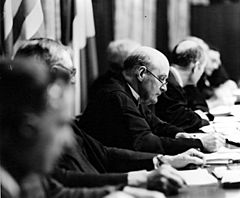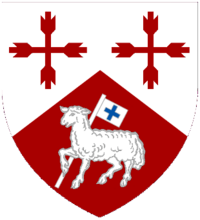Geoffrey Lawrence, 1st Baron Oaksey facts for kids
Quick facts for kids
The Lord Oaksey
DSO TD PC
|
|
|---|---|
 |
|
| Lord of Appeal in Ordinary | |
| In office 1947–1957 |
|
| Preceded by | The Lord Macmillan |
| Succeeded by | The Lord Denning |
| Personal details | |
| Born |
Geoffrey Lawrence
2 December 1880 |
| Died | 28 August 1971 (aged 90) |
| Citizenship | United Kingdom |
| Other political affiliations |
Crossbencher |
| Alma mater | New College, Oxford |
| Occupation | Barrister, judge |
| Profession | Law |
| Military service | |
| Allegiance | |
| Branch/service | |
| Unit | Royal Artillery |
| Battles/wars | World War I |
Geoffrey Lawrence, 3rd Baron Trevethin, 1st Baron Oaksey (born December 2, 1880 – died August 28, 1971) was an important British judge. He is best known for leading the Nuremberg Trials after World War II. These trials were held to judge major war criminals.
Contents
Early Life and Education
Geoffrey Lawrence came from a family with roots in Builth Wells, Wales. His father, Alfred Tristram Lawrence, 1st Baron Trevethin, was also a famous judge. He was even the top judge in England for a short time.
Geoffrey went to school at Haileybury and Imperial Service College. Later, he studied at New College, Oxford, which is part of the University of Oxford.
Starting His Law Career
In 1906, Geoffrey Lawrence became a barrister. This means he was a lawyer who could argue cases in higher courts. He joined a law firm that handled important appeals. These were cases taken to the highest courts in the country.
He became very skilled at presenting cases. Sometimes, he even led cases while more experienced lawyers helped him.
Serving in World War I
When World War I began, Geoffrey Lawrence joined the Royal Artillery in 1914. He served in France and was recognized for his bravery. He was mentioned in official reports twice.
In 1918, he received the Distinguished Service Order (DSO) award. This award is given for excellent service in battle. He continued to serve in the army until 1937.
Becoming a Judge
After the war, Lawrence went back to being a barrister. He also became a lawyer for the Jockey Club, which manages horse racing. Soon after, he took on a part-time job as a judge in Oxford.
In 1927, he became a King's Counsel. This is a special title for experienced lawyers. He was also appointed as the main lawyer for the Prince of Wales, who later became Edward VIII.
In 1932, Geoffrey Lawrence became a full-time judge in the King's Bench Division. This is a part of the High Court in England. He also received a knighthood, which meant he was called "Sir Geoffrey Lawrence."
He was known for being a fair and quiet judge. He didn't seek attention for his decisions. In 1944, he became a Lord Justice of Appeal, which is an even higher judicial role.
The Nuremberg Trials
After World War II, Geoffrey Lawrence was chosen for a very important job. He was selected to be the lead British judge at the Nuremberg Trials. These trials were held in Germany to judge top Nazi leaders for their terrible crimes during the war.
He was chosen because he was an experienced and respected judge. He was then elected as the President of all the judges at the trials. Many people praised how he handled the trials. He worked hard to understand all the evidence. He also made sure that lawyers didn't waste time.
Lawrence was not known for being a brilliant legal thinker. However, he delivered a very clear and powerful judgment at the end of the trials. This judgment explained the court's decisions and their moral meaning.
Life After Nuremberg
After the Nuremberg Trials, Lawrence was given a special honor. He was made a peer and became Baron Oaksey in 1947. This meant he could sit in the House of Lords, which is part of the British Parliament.
He served as a Lord of Appeal in Ordinary from 1947 until he retired in 1957. This is one of the highest judicial positions in the United Kingdom.
Family Life
Geoffrey Lawrence married Marjorie Robinson in 1921. Marjorie also served during World War II in the Auxiliary Territorial Service. She later became a magistrate, which is a type of judge.
They lived on a country estate in Wiltshire. There, Lawrence raised championship Guernsey cattle. They had three daughters and one son. Their son, John, became a well-known amateur jockey and horse racing journalist. He also used the title Lord Oaksey.
Arms
|
Images for kids
-
Lawrence (left) and Francis Biddle (right) talking at the opening session of the Nuremberg trials.
See also
 In Spanish: Geoffrey Lawrence para niños
In Spanish: Geoffrey Lawrence para niños
 | Chris Smalls |
 | Fred Hampton |
 | Ralph Abernathy |




